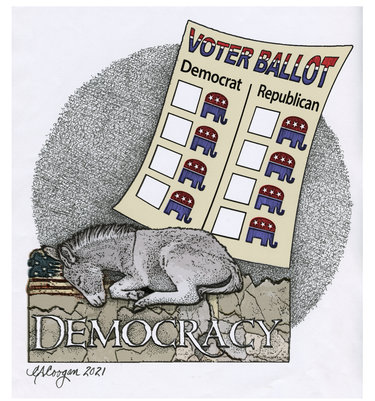Voters need a choice
The foundation of our democracy is a citizen’s right to vote. That is how the people remain sovereign — in control of their leaders and thereby their destiny.
When we vote, we tell our leaders what we want the government to do. In a two-party system, which is what the United States has, choices are clearly delineated. That is why The Enterprise goes to great lengths before every election to interview candidates on the issues — so that voters can inform themselves and choose platforms they believe will be good for their community.
Unlike in many European countries that have a multi-party system, where voters can choose candidates whose views closely match their own, in a two-party system, voters are often left choosing the lesser to two evils.
But, if that party wins, the voter has a strong chance that the platform voted for will be enacted since it is not dependent on a coalition of parties. This distinction was defined in the last half of the 20th Century by E.E. Schattschneider, an American political scientist.
The people are powerless if the political enterprise is not competitive, Schattschneider wrote in “The Semisovereign People: A Realist’s View of Democracy in America.”
That is why we are concerned with the current situation in Westerlo, as outlined in a story by our Hilltown reporter, Noah Zweifel. The town’s Republican and Democratice committees have each nominated the same slate of candidates for the two open town board seats and for the supervisor’s post.
Come November, the only choice voters will have is for town justice: The Democrats have nominated incumbent Ken Mackey while the Republicans have nominated Stuart Eldred.
All three of the board candidates — Lorraine Pecylak and Joshua Beers as council members and Matthew Kryzak as supervisor — are Republicans.
This is in a town with 953 enrolled Democrats and only 578 Republicans.
For decades, as we’ve covered the Hilltowns — where enrollment skews Democratic — we’ve admired the Republicans who chose to run despite the odds. The most frequent answer we got, when we asked why they were running was: The voters need a choice.
And so they do.
The problem of uncontested elections is nationwide. An analysis done by the Associated Press of the 2016 elections showed millions of Americans voting for state representatives in that election had no choice: In 42 percent of the elections, candidates had no major-party opponents.
The percentage of people living in legislative districts without electoral choices has been generally rising over the past several decades, the AP said, citing gerrymandering as a major cause — that is, districts being drawn to deliberately favor one party over another.
While we believe it is essential to solve this national problem, and we back the For the People Act, gerrymandering is not a problem in a town election and certainly not in Westerlo where Democrats far outnumber Republicans and there is a large swath of unaffiliated voters besides.
So we put the question now to Westerlo’s Democrats: Why not field your own candidates?
We realize, as in many rural areas across our nation, support for Donald Trump, starting in 2016, affected Hilltown politics. The Hilltowns had supported Barack Obama in 2012 but went for Trump in 2016.
Locally, town boards in neighboring Berne and Knox that had for decades been dominated by Democrats now have GOP-backed majorities.
But this is no reason for the Democrats in Westerlo not to create their own platform and field their own candidates as Democrats in Berne and Knox have. The voters deserve no less.
Mind you, we are casting no aspersions on the GOP candidates in Westerlo. We simply don’t know Lorraine Pecylak or Joshua Beers as they have not been involved in town government. Matthew Kryzak, who was elected to the Westerlo Town Board in 2019, has performed ably, frequently voting with the two Democrats on the five-member board on important issues.
In June, Democrat William Bichteman abruptly resigned as supervisor, more than two years short of his full four-year term, stating that the role was “too large a sacrifice for anyone to endure.” We were disappointed that someone elected to a post would abandon it, breaking his contract with those who elected him, because the going got rough.
Republican Councilman Richard Filkins said of Bichteman’s departure: “I know a lot of residents who were rejoicing when they found out he was going to leave so it’s not just me.”
Kryzak, on the other hand, was appreciative of Bichteman’s service, saying, “I can tell you that Bill worked very hard as supervisor and brought a lot of good ideas to the table … Public service is not an easy undertaking. It can be just as frustrating as it is rewarding. I have a lot of respect for anyone who will give it a try.”
We know it can be hard. The Enterprise, in covering local elections for well over a century, can attest to the truth of the axiom: The smaller the town, the nastier the politics. Differences too often become personal attacks.
We urge our local politicians to take the high road and stick to the issues when they have disagreements. That is the best way to move forward.
But giving the voters no choice is not the best way forward. We’ve seen in the two villages we cover — Altamont and Voorheesville — how low voter turnout is when there is no choice.
Altamont, for example, has a population of about 1,700. This year, a total of 60 ballots were cast in the village’s uncontested election. That’s about a 75-percent drop from the village’s previous contested election, in 2019. In that election, 210 people voted.
A choice gives citizens a reason to participate — to control the direction of their government. For the good of democracy, Westerlo Democrats, give voters a choice.


